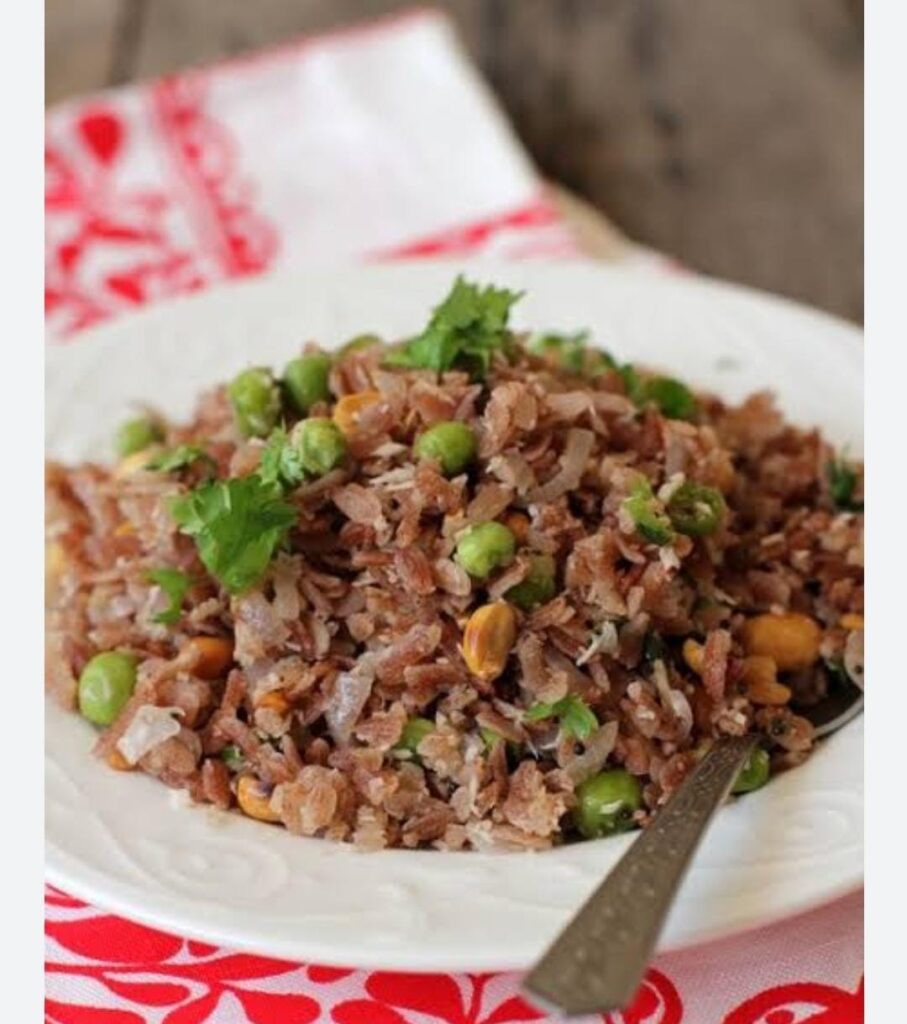Protein Poha

- Red Rice Poha: ¼ cup
- Moong sprouts or
- paneer: 15 gm (1tbsp)
- Diced green chilli: 1
- Peanuts: 1 tsp
- Chopped tomatoes: ½
- Capsicum + Carrots : 2 tsp
- Mustard seeds: ½ tsp
- Red chilli powder: ¼ tsp
- Turmeric powder: a pinch
- Curry leaves: few
- Cooking oil: 1 tsp
- Salt as per preference
- Lemon juice
- Coriander for garnish
Note: 1 cup = 200 ml, ½ cup = 100 ml, 1 tsp = 5 gm, 1 tbsp = 15 gm
*tsp = teaspoon, tbsp = tablespoon
- Boil sprouts until they become soft.
- Rinse the poha with water and set aside till becomes soft and moist. You can sprinkle
some water, if required. - In a pan, heat the oil and roast peanuts in it. Once they have cooked, take them out to
add later. - Add mustard seeds to the same oil and cook until they crackle and then add chillies and
curry leaves. - Saute capsicum and carrots for 5 minutes.
- Then add salt along with chilli powder and turmeric.
- Next, add tomatoes and cook for 2 – 3 minutes. Add a little water and wait for the
tomatoes to become soft. - Add boiled sprouts or paneer as per your choice and mix until well coated with the
mixture. - Lastly, add the soaked poha, mix well and cook for around 3 – 5 minutes. Turn off the
flame. - Add lemon juice, mix well and garnish with roasted peanuts and coriander leaves.
- Enjoy your healthy vegetable protein poha.
Note: Red Poha is made of unpolished rice and is better choice over White Rice Poha.
- Poha is one of the staple Indian recipe that many eat for breakfast, evening snack, or at times even for dinner.
- However, is poha a good option for diabetics, is a common question for many people with Type 1 or Type 2 Diabetes. Well, the answer is yes! People with diabetes can have Poha but in moderation.
- A little tweak in the traditional recipe with addition of Red Rice Poha, Sprouts and Paneer further enhances the nutrition profile making it fiber and protein rich dish that can keep you full for longer hours.
Nutrition Per Serving
Calories (kcal) |
Carbohydrates (g) |
Proteins (g) |
Fats (g) |
|---|---|---|---|
|
282.8 |
40.7 |
6.11 |
4.79 |
Disclaimer: The information provided is for health awareness only and not intended or implied to be a substitute for professional medical advice, diagnosis or treatment. Always consult your doctor or a dietician before making any changes to your lifestyle or treatment regime.
*Images used are for representation purpose only.
Reference:
- Clinical Dietetics Manual; Indian Dietetic Association. 2nd ed. Seth V and Desai N. Elite Publishing House; 2018.
- Longvah.T and Ananthan.R. 2017. Indian food Composition Table. 1st ed. National Institute of Nutrition.
- Fatsecret India. Food Database and Calorie Counter. Accessed 20th Jan 2023. Available at https://www.fatsecret.co.in/calories-nutrition/
- US Department of Agriculture. Food Data Search Results, Fish Salmon Atlantic farmed Cooked Dry Heat. Accessed 21st Feb 2023. Available at https://fdc.nal.usda.gov/fdc-app.html#/food-details/175168/nutrients

